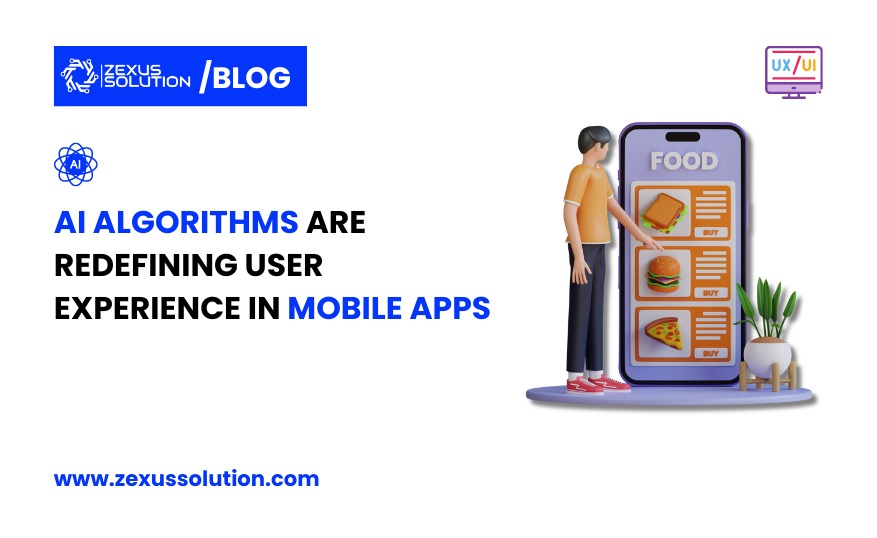Table of Contents
In the changing landscape of technology, artificial intelligence (AI) is playing a major role in user experience in mobile apps. User experience either makes your product successful or not. This is why it’s important to make sure users have a lifetime experience on the platform. And this is why using the innovative approach of AI user experience is the best option.
From customizing recommendations to streamlining workflows, AI is improving convenience and our design perspectives. By integrating artificial intelligence (AI) algorithms, mobile app developers are revolutionizing how users interact with their applications. AI is not just enhancing functionalities but also reshaping the very essence of user satisfaction and interaction dynamics.
Understanding AI’s Impact on User Experience

AI algorithms are at the forefront of transforming user experiences in mobile apps. By analyzing vast amounts of user data in real time, AI can personalize interactions, predict user behavior, and offer proactive solutions. This level of personalization enhances user satisfaction by delivering content and features tailored to individual preferences.
Enhancing Personalization through AI
User experience in mobile apps has evolved from static interfaces to dynamic, personalized experiences. AI algorithms analyze user behavior patterns, preferences, and contextual data to offer personalized recommendations and content. For instance, AI-powered recommendation engines in e-commerce apps can suggest products based on browsing history, purchase behavior, and even current location.
Optimizing Performance and Efficiency
AI-driven optimizations enhance app performance and efficiency, thereby improving user experience. Algorithms can detect and fix bugs in real-time, optimize load times based on usage patterns, and even predict potential issues before they arise. This proactive approach minimizes disruptions and ensures seamless app performance.
Predictive Analytics
AI user experience algorithms can easily predict user actions and needs based on history and patterns. It can make workflow smooth, suggest relevant content, address users’ concerns, and improve overall UX.
AI-Powered Virtual Assistants
Virtual assistants like Siri, Google Assistant, and Alexa exemplify how AI is redefining user interactions in mobile apps. These assistants leverage natural language processing (NLP) and machine learning to understand user queries, provide relevant information, and perform tasks hands-free. Integrating such capabilities into apps enhances convenience and accessibility for users across various contexts.
Automation
AI-driven automation makes complex tasks simple and reduces the cognitive use of users. It enables users to emphasize more on creative and strategic tasks as it automates daily processes and decisions. This helps in a smooth and efficient user experience.
Feedback and Improvement
AI helps in the continuous improvement of UX through feedback analysis and repetition. It gathers and analyzes user feedback to identify pain points and areas for improvement. This helps to the development of exceptional UX design and optimization.
Accessibility
AI can improve accessibility by giving advanced features and interfaces to users with several needs and preferences. It used techniques like recognition of speech, image, and text-to-speech conversion. As a result, AI ensures that digital experiences are easy and accessible to every user.
Advanced Security Measures
As mobile apps deal with sensitive data, AI plays a crucial role in improving security through features like real-time threat detection and biometric data analysis.
Overcoming Issues with AI for Mobile App Design

The potential of AI in improving UX is amazing, but it is surrounded by various challenges. Data privacy and security are paramount in an era where AI constantly processes our data. There is also a requirement to address the ethical implications of AI and maintain security in how AI influences user experiences.
It’s important to maintain a human touch in digital interactions, making sure that technology improves rather than removing human interactions. However, with thoughtful design and ethical considerations, these problems can be changed into opportunities for further improvements and AI implementations.
The Role of AI in Cross-Platform Development

AI technologies have streamlined cross-platform development, enabling developers to build apps that function seamlessly across different operating systems. Tools such as Xamarin and Flutter use AI to simplify the development process, ensuring consistent performance and user experience.
This cross-platform approach significantly benefits Android Application Development and iOS application development, ensuring high-quality apps on both platforms.
Future Trends and Innovations

Looking ahead, AI continues to drive innovation in mobile app development. Emerging technologies like augmented reality (AR) and virtual reality (VR) are leveraging AI to create immersive experiences that redefine user engagement and interaction with mobile apps. As developers seek the best technology for mobile Apps, AI stands out as a transformative force driving these advancements.
Conclusion
In conclusion, AI algorithms are reshaping user experiences in mobile apps by enabling personalization, optimizing performance, and driving cross-platform development. As AI technology evolves, its integration into app development processes will be essential for developers aiming to deliver compelling user experiences. By harnessing the power of AI, developers can stay ahead in the competitive landscape of mobile app development, meeting the diverse needs and expectations of users worldwide.



Add a Comment